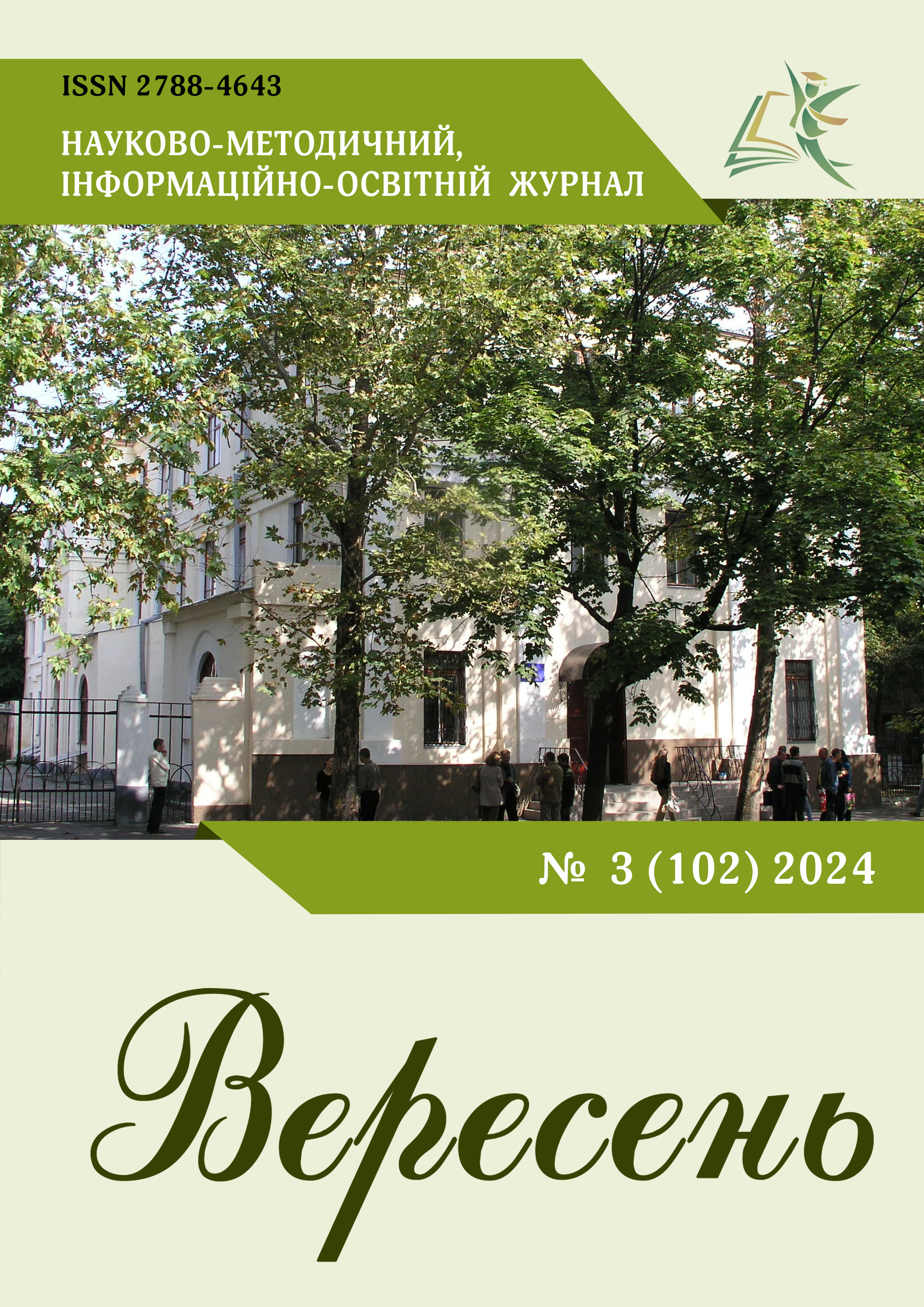THE NATIONAL INDOMITABLE VASYL STEFANYK: UNDERSTANDING HIS LIFE AND CREATIVITY PHILOSOPHY
Article 1
DOI:
https://doi.org/10.54662/veresen.3.2024.04Keywords:
an intelligent reader, national and indomitable, the archetype «Ukraine must be», the philosophy of one’s life, Vasyl Stefanyk’s «The Old Man Hryts» («Did Hryts»)Abstract
For the first time, the life and creative path philosophy of Vasyl Stefanyk as a national indomitable personality according to his works, epistolary, and literary and critical studies of scientists about the artist of the word are represented in the paper. The writer, for Jungian prototypes, appears as a «spirit phenomenon», an «old wise man», a «spirit of a fighter», a «language as the being», «the being of one’s own people», an «independent Ukraine as being», and «Ukraine must be», etc. The abovementioned prototypes orient readers / researchers / teachers of literature to understand the works of Vasyl Stefanyk in general and some texts in particular. The author of the article outlines the following models: «The value-ethical behavioural model of Vasyl Stefanyk», «The model of an intelligent reader of the New Ukrainian School within the system of literary education», and «The model of detecting «loneliness – solitude – isolation» of the characters by students as readers». The object of the presented work is a set of Vasyl Stefanyk’s novellas «Mariia», «The Dew» («Rosa»), «The Arsonist» («Palii»), «The Letter» («Lyst»), «The Trial» («Sud»), «The Angel» («Anhel»), «The Autumn» («Osin»), and «The Sin» («Hrikh»). The article exposes a number of the author’s methodological logic-semiotic models for the first time. Based on life and creative facts of the writer’s heritage and the text of the novella «The Old Man Hryts» («Did Hryts»), the author interprets the images / archetypes in accordance with the mentioned earlier methodological models, worked out in keeping with the fundamental scientific works of the learned (Martin Heidegger, Carl Jung, Viktor Frankl, Volodymyr Velykochyi, Ivan Monolatii, Olha Derkachova, Mykola Zerov, Viacheslav Lypynskyi, Valentyna Moskalenko, Nazip Khamitov, Stepan Khorob etc.). The archetype/image of «Ukraine must be» as a universal model of a «man / behaviour / personality», depicted in the texts of the writer, has been disclosed. The unifying axioms to Vasyl Stefanyk’s characters are «spirit, science, thought, and freedom» (pursuant to Ivan Franko) and the algorithm of actions to implement the dream idea of unity in Ukraine. The designated issue of the «national invincibility of Vasyl Stefanyk» is going to have its logical continuation in a number of further articles by the author.
References
Bryska, O. (2016). Istoryko-literaturni studii. Mykoly Zerova [Historical and literary studies. Mykola Zerov]. Studia. Ukrainica Posnaniensia. Poznan. Zesz. III, 191–200. DOI https://doi.org/10.14746/sup.2016.4.24 (ukr).
Harasym, Ya. (2008). Etnoestetyka Vasylia Stefanyka [Ethnoesthetics of Vasyl Stefanyk]. Mifolohiia i folklor, 1, 63–67. DOI: http://dx.doi.org/10.30970/myf.2008.1%20(1).852 (ukr).
Hnidan, O. D. (1991). Vasyl Stefanyk: zhyttia i tvorchist [Vasyl Stefanyk: life and creativity]. K. (ukr).
Khamitov, N. V. (2017). Samotnist u liudskomu butti. Dosvid metaantropolohii [Loneliness in human existence. Experience of metaanthropology]. K.: «KNT» (ukr).
Khorob, S. I. (2016). Poetyka konfliktu u prozi Vasylia Stefanyka: dramatyzatsiia novely chy epizatsiia dramy? [The poetics of conflict in Vasyl Stefanyk's prose: dramatization of a novel or epicization of a drama?]. Prykarpatskyi visnyk NTSh. Slovo, 2, 405–422 (ukr).
Kilichenko, L., Kononenko, V. & Pylypiuk, O. (1993). Stefanykivski chytannia [Stefanikov readings.]. Vyp. II. Ivano-Frankivsk (ukr).
Kostashchuk, V. A. (1968). Volodar dum selianskykh [Lord of peasant houses]. Uzhhorod: Karpaty (ukr).
Lypynskyi, V. K. (1926). Lysty do brativ-khliborobiv: pro ideiu i orhanizatsiiu ukrainskoho monarkhizmu: pysani 1919–1926 r. [Letters to the bread-making brothers: about the idea and organization of Ukrainian monarchism: written in 1919–1926]. Wien: Buchdruckerei Carl Herrmann (ukr).
Moskalenko, V. V. (2020). Samotnist ta usamitnennia yak vyiavlennia riznykh rivniv iierarkhichnoi systemy potreb liudyny [Loneliness and seclusion as the identification of different levels of the hierarchical system of human needs]. Usamitnennia ta samotnist v zhytti osobystosti, 56–60. Kyiv: DP «Informatsiino-analitychne ahentstvo, (ukr).
Shuliar, V. I. (2022). Model literaturnoi kompetentnosti uchniv-chytachiv Novoi ukrainskoi shkoly [The model of literary competence of students-readers of the New Ukrainian school]. Mykolaiv: OIPPO (ukr).
Shuliar, V. I. (2024). Noomodel intelihentnoho chytacha [Noomodel of the intelligent reader]. Mykolaiv: tsentr redaktsiino-vydavnychoi diialnosti MOIPPO (ukr).
Stefanyk, V. S. (1997). Vybrani tvory [Selected works]. K. (ukr).
Usamitnennia ta samotnist v zhytti osobystosti (2020). [Solitude and loneliness in the life of an individual]. Kyiv: DP «Informatsiino-analitychne ahentstvo» (ukr).
Velykochyi, V. S., Monolatii, I. S. & Derkachova, O. S (2022). (Ne)spodivanyi Stefanyk [(Un)expected Stefanyk]. Brustury: Dyskurs (ukr).
Yunh, K.-G. (2014). Arkhetyp i pozasvidome [Archetype and the unconscious]. Kyiv (ukr).
Zerov, M. K. (1943). Do dzherel. Istoryko-literaturni ta krytychni statti [To the sources. Historical-literary and critical articles]. Ukrainske vydavnytstvo Krakiv. Lviv (ukr).
Zerov, M. K. (1960). Nove ukrainske pysmenstvo. Das neue ukrainische schrifttum: ist. narys [New Ukrainian literature. Das neue ukrainische schrifttum: ist. essay]. Miunkhen: In-t lit., vyp. 1 (ukr).




